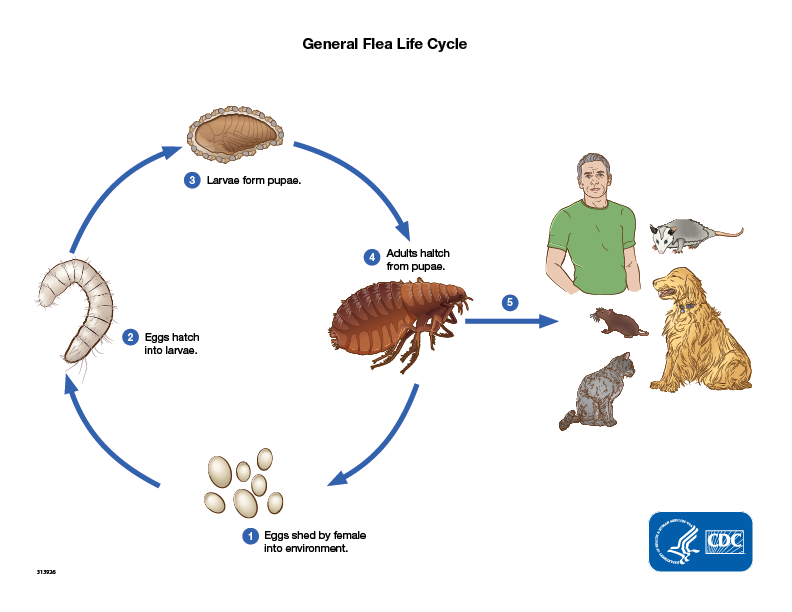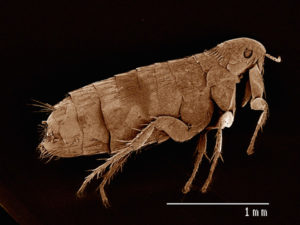Fleas are notorious for being a pet owner’s nightmare, but these tiny parasites don’t discriminate when it comes to their victims – humans and animals alike can suffer their irritating presence. These bloodthirsty pests not only cause discomfort, but also act as carriers for various diseases that can affect both you and your furry companions.
Due to their small sizes, fleas can be relatively tricky to identify. If you’re a pet owner, you’ll probably discover you have fleas by seeing small dark spots jumping on your pet or crawling around in the carpet. Your pet will also start scratching, as flea bites are extremely itchy and annoying.
Traditional chemical pesticides might provide a quick fix, but they often come with a hefty price for your health, the environment, and our essential pollinators – the bees. As awareness grows about the harmful effects of chemical repellents on bees, pets, and wildlife, all natural and organic flea control becomes an increasingly attractive alternative.
Bee Friendly Pest Control is committed to offering pesticide-free, all natural and organic solutions that help you tackle fleas, ticks, and mosquitoes, without disrupting nature’s delicate balance. Our eco-friendly treatments are designed to safeguard your family, pets, and the environment from these potentially hazardous pests.
What Are Fleas?
Fleas are tiny, wingless parasites. There are more than 2,500 fleas species worldwide, and more than 300 species here in the United States. Fleas attach themselves to warm-blooded animals and drink their blood.They go through four growth stages in a three-week lifecycle: egg, larva, pupa, and adult. What makes fleas so difficult to control is that they can adjust each growth stage to adapt to changing conditions.
- Female lays eggs on the host that easily fall off and spread throughout your home and garden.
- Within one to 10 days, eggs hatch into larvae, which prefer warm (75 to 85°F) and humid (50 to 90%) conditions. These “free-living” larvae crawl around, usually hiding at the base of carpets and soil level, away from light. They consume organic material and flea feces to survive, relying on moisture and warmth to flourish.
- After 5 to 12 days of development, larvae spin cocoons and enter the pupal stage. Once mature, adult fleas are triggered to exit their cocoons by movement, pressure, or heat. They typically emerge one to four weeks after entering the pupal stage.
- In the absence of stimulation, the pupal/cocoon stage can lie dormant for around six months. Adult fleas have a lifespan of approximately 100 days. After leaving the cocoon, an adult flea begins feeding within 10 seconds of landing on a host. When biting, the flea injects saliva into the wound, which may help soften the skin and enable better penetration for blood access. The saliva also contains a substance that prevents blood clotting, further aiding the flea’s blood consumption.
Significant Health Risks
The main reason why people dislike having fleas in their homes is the annoyance factor. No one wants a home with fleas, its embarrassing and Flea bites although tiny can be incredibly irritating. Many pets and people develop allergies that make things even worse. However, as blood-feeders, fleas are also vectors for several diseases. Flea-borne Diseases in the United States include:
- Flea Allergy Dermatitis (FAD): This is a common allergic reaction to flea bites in pets, particularly cats and dogs. It causes severe itching, hair loss, and skin inflammation, which can lead to secondary skin infections if not treated promptly.
- Tapeworms: Fleas can carry and transmit tapeworms to pets and, in rare cases, humans. Pets become infected when they accidentally ingest an infected flea while grooming. Tapeworms can cause weight loss, digestive issues, and irritation around the anus in both pets and humans.
- Bubonic Plague: While rare, fleas can transmit the bacteria responsible for the bubonic plague (Yersinia pestis) to humans through their bites. The plague can cause high fever, chills, weakness, and swollen lymph nodes, and can be fatal if left untreated.
- Murine Typhus: Fleas can also transmit Rickettsia typhi, the bacteria responsible for murine typhus, to humans through their bites. This disease can cause fever, headache, rash, and muscle pain, and may require hospitalization in severe cases.
Controlling a Flea Infestation: 95% of a Flea Infestation usually in 5% of the house or yard.
To Effectively control a flea infestation it takes a combination of strategies. Here are some essential tips dealing with a flea problem: keep your home flea-free:
Pet Treatment
- Regular grooming of your pets using flea combs or other products can help detect and remove adult fleas, preventing infestations from worsening. Dip the comb in soapy water to kill any fleas removed from your Pet.
- All pets, cats and dogs should be treated at the same time, any “free-roaming” animals should be kept out of the environment.
- Consult your Veterinarian before attempting a flea control treatment as there is no one chemical that will fit every infestation problem. Some formulations are registered for use on cats, while others may be toxic. There are also collars that have been proven effective for flea control.
Indoor & Outdoor Treatment
- Vacuuming: Frequent vacuuming of carpets, rugs, and upholstery can eliminate flea eggs, larvae, and pupae, reducing their numbers in your home.
- Cleaning Pet Bedding: Washing pet bedding in hot water at least once a week helps destroy flea eggs and larvae, preventing their growth.
- Outdoor Maintenance: Keeping your yard well-maintained by mowing the lawn, raking leaves, and trimming bushes can reduce the likelihood of fleas finding a suitable environment to thrive.
- Natural Flea Remedies: Utilize natural and eco-friendly flea control solutions, such as diatomaceous earth and essential oils to eliminate fleas without harming the environment or your family’s health. Additionally, consider using all natural flea yard treatments to keep your home flea-free. At Bee Friendly, we offer a natural essential oil treatment as part of our Tick prevention that contains a unique blend of pest-repellent oils to keep ticks and fleas out without harming bees, pets, children, or adults. It’s organic, natural, and won’t harm the environment.
Preventing and Keeping Fleas Away from the yard with Bee Friendly Pest Control
At Bee Friendly Pest Control, our organic all natural mosquito, flea and tick yard control is the best preventative maintenance for your yard. This treatment contains only all natural ingredients, it’s safe to use and non-toxic to bees, pets, humans, and even fish!
Frequently Asked Questions
What are the most common signs of fleas in my home?
The most common signs of fleas in your home include itching and scratching pets, flea dirt (small black specks) on pet bedding or furniture, and sightings of adult fleas or larvae.
I have a flea infestation, can Bee Friendly Help?
Yes, But before we the Homeowner has a 5 step must do list:
- Treat and place all animals on preventive medication;
- Clean/Treat inside of home;
- Clean up any and all yard debris and excess overgrowth.
- Cut your grass (1.5 to 2.5 inches in length)
- Ensure you are not overwatering your lawn, a reason for flea infestations
We don’t have fleas, should we still get Flea and Tick Control to you Lawn?
As Benjamin Franklin said “An ounce of prevention is worth a pound of cure” We recommend seasonal treatments, to deter fleas during the season to ensure a Flea-free backyard experience. Bee Friendly Combines all natural treatments for Mosquitos, Fleas, and Ticks.
Keep Your Family Safe with Bee Friendly Natural Pest Control
While ticks and fleas are a common problem in many households, you can keep them out of your home with Bee Friendly Pest Control’s range of natural flea and tick yard control treatments. Whether you have an infestation or want to protect your family, we’re here to help. Contact us at 1-888-4BEE-LUV to schedule an appointment today!
Read More
Our Flea Control Services Are Available in the Following Regions and Beyond
- Philadelphia Suburbs
- Camden County
- Gloucester County
- Burlington County
- Collingswood
- Voorhees
- Deptford
- Mount Laurel
- Burlington
- Cherry Hill
- Haddonfield
- Medford
Why Do Flea Infestations Happen?
Pets Bring Them In
Flea infestations can occur when these tiny pests hitch a ride on pets. Adult fleas feed on their host’s blood and lay flea eggs, which then fall off onto the pet’s bedding, carpets, or upholstered furniture.
Fleas prefer warm-blooded animals, making dogs and cats prime targets. Pets can suffer from flea bites, leading to discomfort and even flea allergy dermatitis. To get rid of fleas and prevent future flea problems, it’s important to schedule professional flea treatments provided by a professional flea exterminator as soon as you can.
Pests Bring Them In
In addition to hitching a ride on pets, flea infestations can also happen when these fleas are carried into homes by pests like rodents or other animals. Rat fleas and oriental rat fleas are two examples of fleas that can be brought indoors by pests.
When these fleas find their way inside, they can start breeding and laying flea eggs in hidden corners, creating a flea problem within your home. To effectively control fleas in such cases, it’s essential to call pest control experts like us.
Frequently Asked Questions
What are the most common signs of fleas in my home?
The most common signs of fleas in your home include itching and scratching pets, flea dirt (small black specks) on pet bedding or furniture, and sightings of adult fleas or larvae.
I have a flea infestation, can Bee Friendly Help?
Yes, but before we arrive, you must follow our 5-step must-do list:
Treat and place all animals on preventive medication;
Clean/Treat inside of home;
Clean up any and all yard debris and excess overgrowth.
Cut your grass (1.5 to 2.5 inches in length)
Ensure you are not overwatering your lawn, a reason for flea infestations
We don’t have fleas, should we still get flea and tick control for our lawn?
As Benjamin Franklin said, “An ounce of prevention is worth a pound of cure.” We recommend seasonal treatments to deter fleas during the season to ensure a flea-free backyard experience. Bee Friendly combines all-natural treatments for Mosquitos, Fleas, and Ticks.
Will a flea extermination keep them out of my home permanently?
While flea exterminators can effectively kill adult fleas and disrupt the flea’s life cycle, it’s important to understand that flea extermination may not always be permanent — fleas reproduce rapidly, and their flea larvae and flea eggs can be challenging to eliminate completely.
Therefore, professional flea treatment may require follow-up visits and the use of insect growth regulators to prevent fleas from maturing and reproducing. A pest control professional from Bee Friendly can provide guidance on the flea exterminator cost and the best approach for long-term flea control.
How long do flea extermination services take?
The length of a flea extermination service can vary depending on the severity of the flea infestation and the size of the treated area. In many cases, initial treatment may take a few hours, during which flea exterminators apply residual insecticide to eliminate fleas and their flea larvae.
However, follow-up visits may be necessary to ensure the complete extermination of fleas. It’s essential to follow the advice of our professional exterminator and continue with flea prevention measures to ensure that your home remains a flea-free environment
Keep Your Family Safe with Bee-Friendly Natural Pest Control
While ticks and fleas are a common problem in many households, you can keep them out of your home with Bee Friendly Pest Control’s range of natural flea and tick yard control treatments. Whether you have an infestation or want to protect your family, we’re here to help. Contact us at 1-888-4BEE-LUV to schedule an appointment today!



